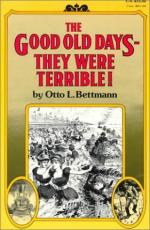
|
| Name: _________________________ | Period: ___________________ |
This test consists of 5 multiple choice questions, 5 short answer questions, and 10 short essay questions.
Multiple Choice Questions
1. How were medical advances defined during the Victorian period?
(a) They were considered a boom during this time.
(b) Medical breakthroughs were common.
(c) They did not keep pace with technological advances.
(d) Medical advances were few but very helpful.
2. According to Bettmann in "Food and Drink," in what condition were the cows when they arrived at the slaughterhouse?
(a) Fattened up by feed.
(b) Starved and sickly.
(c) Fattened up by steroids.
(d) Tainted with disease.
3. According to Bettmann in "Health," medical colleges were designed primarily to do what?
(a) Eradicate disease.
(b) Send out qualified physicians to the frontier.
(c) Educate doctors.
(d) Make money off of tuition.
4. What other problems did city schools face in the post Civil War era?
(a) Teacher turnover.
(b) Student crime.
(c) Lack of decent materials.
(d) Poor lighting and poor air quality.
5. What was Boss Tweed and Tammany Hall?
(a) Two famous New York cops.
(b) An infamous night club known for illegal trafficking.
(c) A country-western song.
(d) A corrupt political crime ring.
Short Answer Questions
1. When was opium introduced?
2. How long did a typical rural school year last in the late 19th century?
3. What was the biggest problem with the police in the post Civil War era?
4. Between 1860 and 1890, how much did the crime rate go up?
5. Which part of the population got to enjoy the luxuries of ocean liners in the late 19th century?
Short Essay Questions
1. In the late 19th century, how did ocean liner travel exemplify the differences in travel for the rich and travel for the poor?
2. What were the ventilation problems associated with train travel in the late 19th century?
3. In the late 19th century, how did the lack of a meat-packing industry affect the quality of meat that was available to the general public?
4. After the Civil War, how effective were the hospitals at helping the sick and infirm?
5. How did city politicians add to the crime problem?
6. What type of education did blacks receive during the post Civil War era?
7. What teaching methods were emphasized by many teachers in the late 1800s?
8. How did the lack of medical advances affect the population of the post Civil War era?
9. According to Bettmann in "Travel," how were the below-deck boilers a danger to ferry travelers?
10. Why were the some ocean liners nicknamed "fever ships" and "floating coffins"?
|
This section contains 740 words (approx. 3 pages at 300 words per page) |

|




